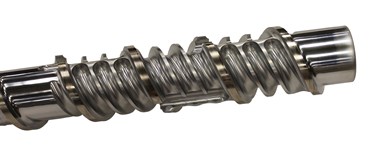Extrusion: Two-Stage Screw Offers Distributive, Dissipative Mixing
New design from Davis-Standard offers outputs comparable to barrier screws at lower melt temperatures.
The new DS-Blend feedscrew from Davis-Standard (D-S) provides distributive and dissipative melt mixing. The two-stage design reportedly achieves outputs similar to those provided by barrier screws, but at ower melt temperatures and reduced energy requirements. It can be installed on new or existing single screw Davis- Standard extruders as well extruders from competing suppliers. John Christiano, D-S’ v.p. of technology, calls the new design “one of our most versatile and energy-efficient feedscrews to date.” He adds, “As with all of our feedscrew designs, we are focused on product line performance, improved outputs, material homogeneity and feedscrew longevity.”

Feedscrews are available from 3/4 to 12 in. diam. with varying L/Ds. Each screw is engineered for specific polymers and processes with customization available depending on end product. Davis- Standard feedscrews accommodate the full range of extrusion and converting applications including blown film, blow molding, cast film, compounding, elastomer, extrusion coating, fiber, laboratory, pipe, profile and tubing, reclaim, sheet and specialty systems. Testing and trials are available to fine-tune the process prior to purchase.
As part of what it calls a “start to finish” high-quality feedscrew-manufacturing process, D-S uses plasma-arc welding stations to provide wear-resistant materials such as Colmonoy 56 and 83. Three state-of-the-art whirlers are used for screw cutting and milling for screws made of stainless steel, 4340 steel or Inconel materials. These machines produce screw surfaces at very tight tolerances. After screws are milled and polished, they are treated with chrome plating or other wear-resistant coatings based on application. Screws receive a final inspection and polish before shipment.
Related Content
-
Reduce Downtime and Scrap in the Blown Film Industry
The blown film sector now benefits from a tailored solution developed by Chem-Trend to preserve integrity of the bubble.
-
What to Know About Your Materials When Choosing a Feeder
Feeder performance is crucial to operating extrusion and compounding lines. And consistent, reliable feeding depends in large part on selecting a feeder compatible with the materials and additives you intend to process. Follow these tips to analyze your feeder requirements.
-
How To Identify Resin Degradation in Single-Screw Extruders
Degradation can occur in many single-screw extrusion operations, and typically occurs due to minor design flaws in the screw. Here is how to track it down.





